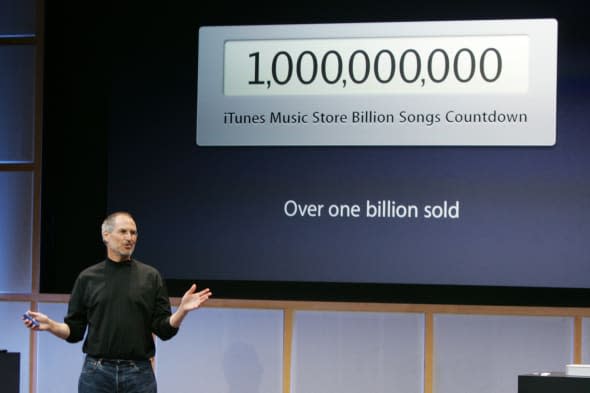Steve Jobs was never a fan of subscription music

While Apple's rumored deal to acquire Beats is not yet official, people are trying to future out why Apple wants a company that sells divisive headphones (consumers love them, audiophiles don't) and subscription music, among other things.
Most industry watchers believe that Apple has its eyes set on Beats' on-demand streaming music service, which is similar to Spotify among others. If they're right and Apple ultimately releases a subscription music service, it would mark a significant departure from Apple's longtime position that consumers want to "own" their music. Of course, with services like Spotify and Pandora continuing to chip away at the once impervious armor of iTunes, it'd be less than encouraging for Apple to remain beholden to a business philosophy regarding music consumption that was forged over 10 years ago.
Apple's long history of avoiding music subscriptions can certainly be attributed to Steve Jobs, who wasn't afraid to voice his opposition to the idea. To that end, Billboard recently dug up some of Jobs' most famous quotes regarding music subscriptions.
Jobs first addressed the notion of music subscriptions during a 2003 interview with Rolling Stone:
We told [record labels] that the music subscription services they were pushing were going to fail. MusicNet was gonna fail. Pressplay was gonna fail. Here's why: People don't want to buy their music as a subscription. They bought 45s, then they bought LPs, they bought cassettes, they bought 8-tracks, then they bought CDs. They're going to want to buy downloads.
...
The subscription model of buying music is bankrupt. I think you could make available the Second Coming in a subscription model, and it might not be successful.
One year later, Jobs reiterated these same points during a 2004 in-depth interview with Billboard.
How do you view the subscription model vs. the iTunes à la carte download model?
Steve Jobs: We have more discussions with the content owners than anyone else. This is something we've pursued right from day one. If for $10 a month you could put 10,000 songs on your iPod, we'd like to know about it. But you can't, because there's no business model that makes sense for the labels, or the subscription fees you would have to pay are ridiculous.
What's especially interesting about Jobs' aversion to music subscriptions is that a number of music insiders tried for some time to convince Jobs otherwise.
During an interview with Inc. earlier this year, Beats co-founder Jimmy Iovine said that he has long been trying to convince Apple that subscriptions are the way to go, especially given the vast number of credit cards Apple already has on file.
I've been meeting with Apple about subscriptions since 2004. Every two months. I think they're an incredible company, and I wanted them to do subscriptions. I think they have the platform to do it. They have 400 million credit cards, an audience that likes music. And they have, ya know, iTunes!
In addition, former MySpace, Sling Media, and MTV executive Jason Hirschorn recalled in 2011 how he also tried to convince Jobs on the merits of subscriptions.
It was me, Van Toffler (president of MTV Networks Music Group), Tom Freston (CEO of MTV-parent company Viacom), and Jimmy Iovine (music producer, chairman of Interscope-Geffen). It was Jimmy who introduced us to Jobs, and we flew up to Pixar to go meet him. I'm a product guy, so it was thrilling for me. If you're a product guy, Steve Jobs is the guy you want to meet. He was incredibly gracious and nice.
We had been thinking up ideas about how we could work with Apple...So, I give him my views on the future of music, and I was always big on subscription services. He listened and then he said, "Jason, you seem like a nice guy, but your ideas are all wrong." He was so blunt and funny, the whole room burst into laughter.
Interestingly, the entirety of Hirschorn's comments at the time now appear quite prescient. Hirschorn articulated that Apple at the time didn't need to bother with subscriptions because the iTunes downloads tap was running on full throttle. And though Hirschorn championed subscriptions, he conceded that the economics at the time didn't fall in favor of subscriptions:
Apple knew they didn't have to go into subscriptions at the time because they had such a huge lead [in downloads]. You watch Apple, they move when they need to move. I remember looking at the economics, and the amount of money Apple might have made on a subscription service would have been less than the money they were seeing on download revenue per user at the time.
These days, the evidence that Apple needs to make some serious moves in the music space continues to mount. Digital downloads are on the decline despite Apple's best efforts to funnel in users via exclusive promotions like the Beyonce deal that ran in late 2013. Also, it's been reported that iTunes Radio hasn't been as successful at transforming casual listeners into song buyers as Apple was initially hoping.

